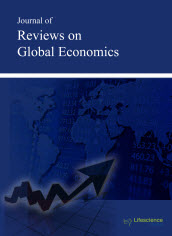The Effects of Determinants of Government Expenditure on Education and Health: Evidence From SADC Economies
Keywords:
Government Expenditure, Government Expenditure on Education, Government Expenditure on Health, Corruption, Economic Growth, Population, Panel data.Abstract
Health and education expenditure play a major role in determining the well-being and development of the people. However, SADC economies have poor health and education indicators, despite high expenditure by governments. The purpose of this study is to assess the determinants of government expenditure on health and education in SADC countries. This study used the annual data covering the period 1997 to 2017. FMOLS1 and DOLS2 are applied to estimate the parameters of each variable understudy. The techniques were developed to estimate and test hypothesis about cointegrating vector to panel data. Overall the results revealed that gross domestic product, population growth and corruption are crucial determinants of health and education expenditure in SADC countries. Therefore, governments in SADC can implement policy that are pro economic growth, and measures that discourages corruption. This can be achieved by allocating high budget on education expenditure, and implementing independent corruption agencies.
Downloads
Published
How to Cite
Issue
Section
License
Policy for Journals/Articles with Open Access
Authors who publish with this journal agree to the following terms:
- Authors retain copyright and grant the journal right of first publication with the work simultaneously licensed under a Creative Commons Attribution License that allows others to share the work with an acknowledgement of the work's authorship and initial publication in this journal.
- Authors are permitted and encouraged to post links to their work online (e.g., in institutional repositories or on their website) prior to and during the submission process, as it can lead to productive exchanges, as well as earlier and greater citation of published work
Policy for Journals / Manuscript with Paid Access
Authors who publish with this journal agree to the following terms:
- Publisher retain copyright .
- Authors are permitted and encouraged to post links to their work online (e.g., in institutional repositories or on their website) prior to and during the submission process, as it can lead to productive exchanges, as well as earlier and greater citation of published work .


